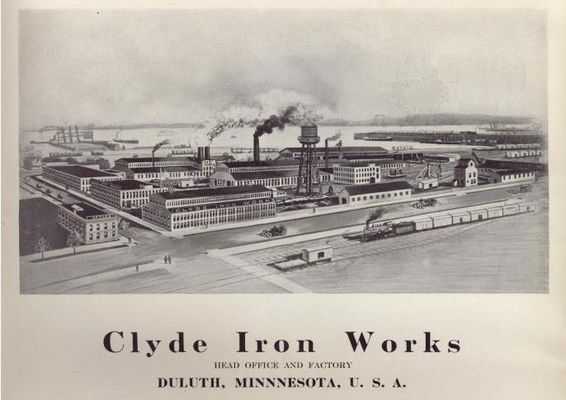The Clyde Iron Works restaurant and event center at Clyde Park is now open at 29th Ave. W. & Michigan St. in Duluth’s Friendly West End. Here’s a little Clyde historical timeline.
1898 | Clyde Iron Co. (founded in 1889) moves its operations from South Lake Avenue to 29th Ave. W. & Michigan St.
1901 | Northwestern Manufacturing buys the company for $1; name changes to Clyde Iron Works. The company is restructured and sold several times in following years.
1961 | Clyde builds what is believed to be the world’s largest portable hoist, used by American Bridge Co. in building the Verrazano-Narrows Bridge in New York’s harbor.
1986 | Clyde Iron’s Duluth operation closes and moves to St. Paul, merging with the marine division of American Hoist & Derrick to become AmClyde.
1987 | Milton M. Siegel Co. acquires the Clyde Iron property. Duluthian Jerry Siegel begins marketing it as Clyde Industrial Park.
1988 | Eight former Clyde Iron employees form the Duluth Engineering & Manufacturing Co. after striking a deal to make replacement parts for AmClyde’s custom-built cranes. DEMCO buys Clyde’s idled equipment, leases its facilities, and employs some former staff.
1996 | State of Minnesota takes over the property. The Ziegler Family Trust, based in Encino, Calif., would later acquire it. The trust retains Siegel to manage the property.
2001 | A skateboard park briefly occupies part of the Clyde property.
2003 | Iron Clyde closes. The 10.5-acre Lincoln Park site is purchased by Duluthian Alessandro Giuliani. The structures contain a combined 184,000 square feet of space.
2004 | Giuliani and his wife Dawn purchase the former Duluth Malting & Brewing Co. building adjacent to the Clyde properties, bringing Clyde Park’s total indoor square footage to 200,000. Later in the year, an ice resurfacing machine explodes at nearby Peterson Arena, causing a fire that would destroy western Duluth’s only indoor hockey facility.
2005 | The Duluth Heritage Sports Committee forms with intentions of rebuilding Peterson Arena, which would be located next to a planned $26-million Ray and Joan Kroc Corps Community Center. The committee later decides there will not be enough space for the hockey arena and the Kroc Center, and chooses to build at Clyde Park instead.
2007 | Salvation Army announces it will not build a Kroc Center in Duluth. Construction begins on Heritage Sports Center.
2008 | $15.6 million Heritage Sports Center opens.
2009 | Athletic Republic, a sports training facility, opens. The Duluth Children’s Museum purchases the Duluth Malting & Brewing Co. building from the Giulianis.
2010 | Clyde Iron Works restaurant and event center opens.
